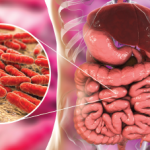“There are a lot of people who promote veganism, but I don’t want to imply that’s what we should do at this time,” she says. “First, MAP is not present in all dairy/beef products, and our study showed that mostly those patients who were both PTPN2/22 gene positive and MAP positive were the ones more likely to have [RA], again suggesting that it is the gene-environment interaction that leads to the cascade of immune activation. Second, this was a small sample size, [so] the findings have to be validated with larger studies.”
Meanwhile, Dr. Bég tells her patients RA is a very complex disease and there’s an interplay between a patient’s genetic makeup and the environment they inhabit. “Not everybody who is infected will get the disease. But we should be aware of what we eat and how our food is processed, because there is growing evidence that bacteria present in foods may activate different autoimmune diseases.”
Dr. Naser says it may prove sufficiently protective for those at risk of developing RA and those who already have RA to take food preparation and purchasing precautions with milk and meat. Produce grown with cow manure should be washed carefully before consumption. Dr. Naser recommends consuming ultra-pasteurized milk, which is heated at higher temperatures than normal pasteurized milk (280ºF or more for at least two seconds) and packaged under near sterile conditions. And meat, including goat, sheep and lamb, in addition to beef, should be well cooked. “If you see blood in your steak, be assured MAP is alive!” he says.
Dr. Bég advises her patients to avoid processed foods and to eat food grown organically and local, if possible.
The patients studied were asked to recall and write down how often they eat meat, fruits and vegetables so the researchers can look at whether there’s a higher correlation between which foods they’re eating and whether they have MAP. “So far we have not found a correlation,” Dr. Bég says, “but getting a diet diary is very hard. People don’t always remember what they eat.” Further studies are needed in this area.
Dr. Naser would like to see genetic testing after birth soon, so people can see which genes may be mutated and which diseases, such as Crohn’s and RA, may be triggered. “If you can adjust your lifestyle, food choices and avoid exposure to certain environmental triggers, you may prevent a lot of pain.”
MAP Antibiotics
The researchers also propose that if there is MAP bacteria in the blood, antibiotics should be considered in addition to the biologics or drugs the patient may already be taking for inflammation. “We hope to change the dogma and understanding,” Dr. Naser says. “We know antibiotics work on patients with Crohn’s disease.” Although some RA patients may also have Crohn’s and vice versa, the researchers say the evidence is anecdotal and a national study is needed to learn more about these patients.

